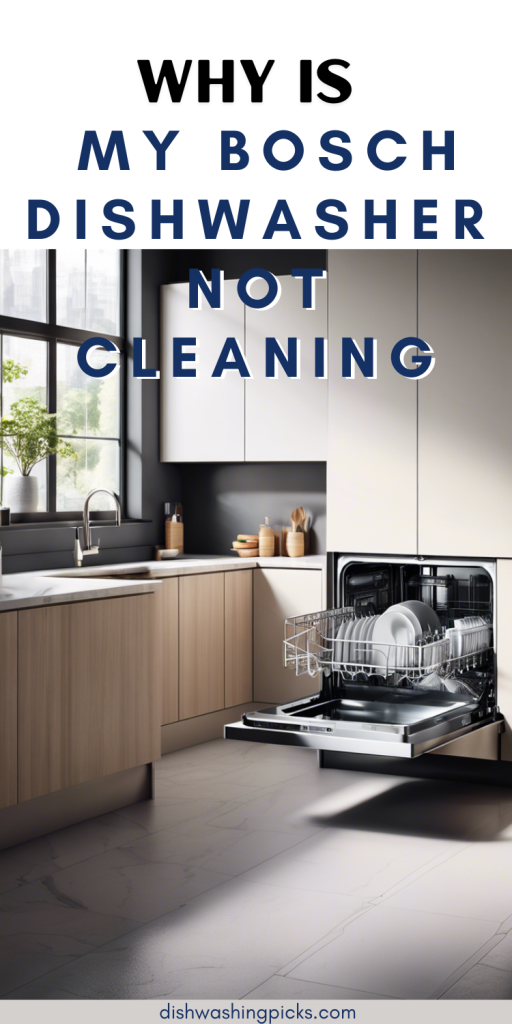We’ve all been there—open the dishwasher door after a full cycle, and boom… you’re staring at dirty dishes. But here’s the kicker: you’ve used your Bosch dishwasher for ages, and it’s usually the trusty workhorse of your kitchen. So, what gives? Why is your Bosch dishwasher suddenly not cleaning as it should?
Well, you’re not alone. It happens to the best of us, and thankfully, it’s often a simple fix. But before you start throwing your hands up in despair, let’s break this down and see what might be going wrong. Ready? Let’s dive into it.
1. Clogged Spray Arms: They Do the Hard Work
Imagine this: your Bosch dishwasher’s spray arms are like the arms of a hardworking chef—constantly flinging hot water to clean every plate, bowl, and utensil. But if those spray arms are clogged with food debris, grease, or even mineral build-up, your dishwasher can’t do its job properly.
What You Need to Know:
If your Bosch isn’t cleaning well, the spray arms could be blocked. The spray arms rotate and shoot water at your dishes, but when the holes get clogged, they can’t reach the areas that need the most cleaning.
What to Do About It:
Take a look at your spray arms. Are there bits of food or grime stuck in the holes? Use a toothpick, brush, or a small pin to clear them out. It’s quick, easy, and will go a long way in improving your dishwasher’s cleaning performance. A clean spray arm = happy, clean dishes.
2. Dirty Filter: It’s the Little Things
Now, you might not think much about the filter in your Bosch dishwasher, but trust me, it’s a critical player. If your filter gets clogged, all that food and debris it’s meant to catch is just floating around in the water, and guess where it ends up? That’s right—back on your dishes.
What You Need to Know:
Your Bosch dishwasher filter collects food particles and prevents them from circulating back into the wash. If it’s dirty, your dishes could end up dirtier than they started.
What to Do About It:
You should clean the filter about once a month (more if you’re washing heavy-duty stuff like pots and pans). Just pull it out, rinse it under warm water, and scrub it with a soft brush. Don’t forget to check for any small debris that might be lodged in there.
3. Water Temperature: Warm Up Those Dishes
Picture this: you’re trying to wash grease-laden pots, but the water is too cold to break down the oil and grime. What happens? Yep, your Bosch dishwasher leaves spots or food still on your dishes.
What You Need to Know:
If the water temperature in your dishwasher isn’t hot enough (around 120°F or 49°C), it won’t clean effectively. Warm water helps break down oils, fats, and food remnants, leaving your dishes sparkling clean.
What to Do About It:
Check the water temperature by running the hot water in your sink for a minute, then using a thermometer. If it’s not hot enough, adjust the settings on your water heater. Pro tip: Run your sink’s hot water before starting the dishwasher to ensure it’s already at the right temperature.
4. Water Quality: Hard Water Woes
If you’ve got hard water in your area, you’re likely no stranger to limescale buildup, water spots, and cloudy glasses. And guess what? Hard water can seriously mess with your Bosch dishwasher’s performance.
What You Need to Know:
Hard water contains minerals like calcium and magnesium, which can build up in your dishwasher over time. These minerals can coat your dishes and even cause blockages inside the machine.
What to Do About It:
You can add a water softener or a rinse aid to your dishwasher. Rinse aids help prevent water spots and improve drying. If you’re dealing with a significant amount of hard water, consider installing a whole-house water softener. It’s an investment, but it’ll help not just your dishwasher, but your plumbing and appliances in general.
5. Dishwasher Overload: Less is More
We know the temptation: cramming in as many dishes as possible so you don’t have to run another cycle. But here’s the deal—overloading your Bosch dishwasher can block the water from reaching all your dishes. Result? A lot of dirty dishes left behind.
What You Need to Know:
Your dishwasher’s spray arms need space to move around and spray water at your dishes. If you overcrowd the racks, some items won’t get cleaned properly.
What to Do About It:
Take a little extra time when loading your dishwasher. Make sure dishes aren’t stacked on top of each other and that there’s enough space for the water to circulate. Trust me, it’ll save you a second cycle (and maybe a little sanity).
Finally: Getting Back to Clean Dishes
So, if your Bosch dishwasher isn’t cleaning properly, don’t panic! It’s usually one of these simple issues causing the trouble. From clogged spray arms and dirty filters to water temperature and hard water issues, there’s always a solution at hand.
Start by checking the basics—spray arms, filter, and water temperature—and go from there. Most issues can be fixed with a little elbow grease and attention to detail. And if all else fails, don’t hesitate to consult your Bosch manual or call in a pro.
Has your Bosch dishwasher been acting up recently? Have you tried any of these tips? Share your experience in the comments, or let us know if you’ve got any other cleaning tips up your sleeve!

